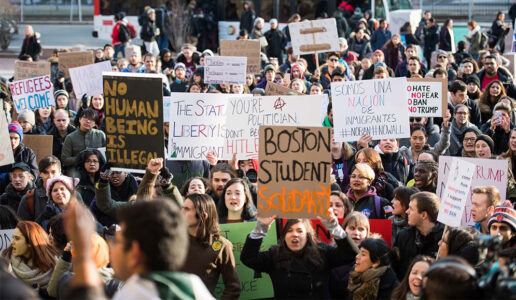Pardee School Signs APSIA Statement on Travel Ban

The Frederick S. Pardee School of Global Studies at Boston University joins other leading schools of international affairs in signing the “Commitment to Diversity” Statement issued by the Association of Professional Schools of International Affairs (APSIA) in response to the recent Presidential executive order restricting visa issuance from seven Muslim-majority nations. Dean Adil Najam signed the APSIA statement on behalf of the Pardee School.
Deans from leading schools of global studies and international affairs including, the Fletcher School of Law and Diplomacy at Tufts University, the Walsh School of Foreign Service at Georgetown University, the Jackson Institute for Global Affairs at Yale University, the Elliott School of International Affairs at George Washington University, and the School for International Service at American University also signed the statement aimed at helping students, schools, organizations, and partners transform themselves into more effective agents of positive change in an environment of mutual respect for all.
From the text of the APSIA Commitment to Diversity Statement:
People from all points of view, religions, races, and backgrounds contribute to the education APSIA schools provide. Our community of tens of thousands of students, faculty, alumni, and staff come from nearly every country in the world, as our schools are committed to diversity and inclusion.
We know diversity is an asset. Our students encounter different and divergent perspectives, so that they are adequately prepared for the complex, interconnected world in which they live. They learn to separate information from knowledge. They build a framework to evaluate choices and form opinions based on the analysis of concrete information.
Policy choices matter. They affect people’s lives. That’s why we dedicate ourselves to educating current and future leaders about the issues that connect us. By design, our schools and our students focus on international affairs and policy, because they want to serve a good larger than themselves.
Our students come to master aspects of international affairs in all its complexity. The APSIA community remains dedicated to helping students, schools, organizations, and partners transform themselves into more effective agents of positive change in an environment of mutual respect for all. We will also work to provide a vehicle for representatives from our Schools – deans, faculty, career specialists, academic advisers, communications staff, and others – to consult on issues that go to the heart of what we do.
The Pardee School hosted a town hall discussion as part of the school’s Beyond the Headlines, or BtH, series on February 1, 2017 that brought together expertise and scholarship on diplomacy, immigration law, security, intelligence and the broader field of global studies for a conversation on the global implications of the executive order. The discussion, entitled “Refugees, Immigrants, and Us,” provided students and faculty from across Boston University the opportunity to share their thoughts and concerns on the executive order.
Pardee School faculty have discussed the implications of the executive order in various media outlets, including Research Professor Jessica Stern who published an Op-Ed in the Boston Globe in which she argues the executive order on immigration actually makes the United States less safe. Amb. Robert Loftis, Professor of the Practice of International Relations at the Pardee School, was interviewed by the Christian Science Monitor on an official protest among career diplomats at the State Department in response to the executive order. Dean Adil Najam was interviewed by Metro on the effect the executive order on immigration will have on universities across the United States.
Boston University President Robert Brown sent a letter to the BU community on January 29, 2017 calling the executive order on immigration “fundamentally inconsistent with the values that are the bedrock of Boston University and, indeed, of our pluralistic, welcoming society.” President Brown also published an Op-Ed in the Boston Globe on January 30, 2017 on the executive order entitled “Trump’s Travel Ban Diminishes Our Nation.”
From the text of the Op-Ed:
The new administration’s executive order to temporarily ban people from seven Muslim nations from entering the United States is fundamentally inconsistent with the values that are the bedrock of higher education, and indeed, of our pluralistic, welcoming society. The executive order diminishes our nation as a beacon for freedom and opportunity. As an academic community, we must stand together to support each other at this time of uncertainty and use a clear voice to affirm our principles and voice our deep concern.
The moral argument against the action is amply clear. It has been described in many editorials and think pieces in the last several days. The order, now partially stayed by federal judges, may be more symbolic than effective in the long run, but the symbolism is extremely troubling, because it plays to base fears and bias against foreigners and sets us on a path to see every immigrant as a threat. In universities, we see things very differently. We believe that open immigration is good for the long-term health of higher education, our country, our economy, and our society.
You can read the entire Op-Ed here.